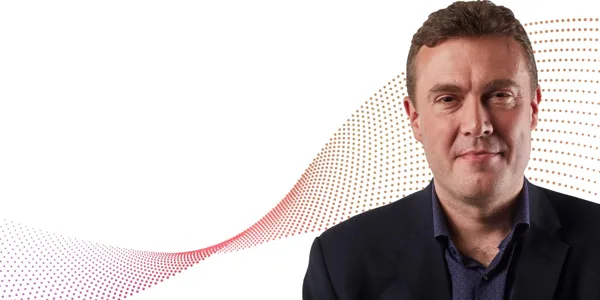Richard Yeo
How an early love of computers led to a career in technology

Published: 16/12/2020
Computers were an early passion for Richard Yeo. In 1980s Devon, that meant the clunky charms of a Commodore 64 or Acorn Electron but he quickly taught himself to navigate them. For Richard, it was a distraction from school life, which held little interest. He resolved to get a degree in computing and find a job in the sector.
The first part was easy – he graduated from Loughborough with a BSC in Computer Science – but, amid the 1994 recession, finding the right job proved more difficult. He tried to find work in Devon but soon realised he’d have to broaden his horizons if he was to fulfil his ambitions.
Eventually, a job at Hewlett Packard beckoned: “This was a really good break. HP allowed people to be entrepreneurial and we really had to do well for our customers. The culture was all about timely delivery and making things happen.”
He saw entrepreneurship up close and personal. A lot of his work was for EasyGroup, an incubator launched by Easyjet founder, Sir Stelios Haji-Ioannou. Richard sat next to Stelios when he was in the office, which taught him a lot about entrepreneurship, both good and bad. Not all the businesses succeeded, particularly around the time of the DotCom crash, but the work was interesting and provided vital experience.
After leaving EasyGroup, he carried out a number of Chief Technology Officer (CTO) roles at Fish4 and Ecommera before he became Group CTO for the Digital Property Group (now Zoopla). All was going swimmingly until the Group announced a merger and he was faced with the prospect of dismantling the crack team he’d carefully assembled recently or leaving. He chose to leave.
It turned out to be just the catalyst he needed: “Starting a business at 39 wasn’t easy. I had responsibilities and would probably never have done it unless I’d been forced into it. I’d built up enough cash not to work for a while and I thought ‘now or never’.
I never looked back. On reflection, I was sorry I hadn’t done it earlier. I needed to be forced to do it and pushed to give up a comfortable salary.
He’d already had the idea. In his CTO experience, Richard had done a lot of outsourcing and always felt it could be done better. As a CTO, he wanted greater control and transparency of the nearshore/offshore resource. This was what he sought to provide through TechHuddle.
Richard hit the ground running: “The first year was amazing. We hired 45 staff [and] got five major clients. We just grew and grew and added our on-demand service. Each part of the business complemented each other really well. It was amazing.”
Then, as happens for many businesses, it hit a rough patch. A client went bust and hadn’t been honest about its financial position: “It was horrible. We had to dig deep, go through it and do our best. The Brexit referendum was also problematic. All our development resources were in Bulgaria so the weakened Sterling had an impact on our profitability and competitiveness.”
Nevertheless, they got through it and Richard came out the other side, eventually successfully selling the business to a private equity house at the end of 2019 with plans to retire and travel the world with his family. The pandemic had other plans for us all, of course, so he’s certainly seen more of his family but all overseas travel plans had to be put on hold.
There was also the familiar entrepreneur’s dilemma. Richard was left with his sale proceeds. While he recognised the importance of investment, it was tough to cede control to capricious stock markets, particularly amid a volatile time in markets: “I had to put my money in the stock market and not being in control was very difficult. In the end, I agreed with Evelyn Partners to invest every week or two weeks on a schedule. This helped me manage it better, rather than trying to time the market.”
He has two chairmanship positions, which keep his brain ticking over, but is he tempted to do it all again? An emphatic ‘no’. His father had also been an entrepreneur and so he was acutely aware of falling into the trap of ‘Dad is working’: “My intention has always been to retire and spend more time with my family and definitely not to launch another business. I may help my children launch businesses, as and when the time comes, but it takes huge dedication: I’m approaching 50 and my energy levels aren’t what they used to be!”
